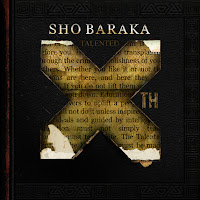About two years ago, Christian rapper Sho Baraka
announced that he was leaving Lecrae’s high-profile label, Reach Records. He
did so because he claimed that he felt artistically restricted. Indeed, Reach
Records is one of the premiere Christian rap labels in the nation, and has a
reputation for its “unashamed” stance for Christ. Because of this, Reach, like
many other Christian rap artists and labels has a tendency to sound the same.
Every album sounds the same. Every artist deals with exactly the same subjects:
worship, rebuke to hip hop culture, a song to show a promiscuous girl her
worth, etc. Every cd drags on repetitively and boringly. Sho felt like he
wanted more artistic control. He was determined to deal with subjects that are
considered taboo in the Christian community, like racism, poverty, economic
disparity, etc. So he split.
An artist’s job is self-expression. Whether they are a
rapper, musician, poet, or a painter they draw from life experiences, feelings,
and emotions to create. One of the most frustrating thing for an artist is to
be pigeonholed and censored. For an artist to be told “you can’t write this” or
“you can’t say that” is to kill inspiration. Truth be told, musicians and
rappers/poets are the only artists that “the church” demands must produce
purely “Christian art”. I’ve never heard anyone chastise a painter for painting
“non-Christian” portraits. Nor have I heard of anyone demanding someone who
draws to only draw pictures of Christ. Why do we put this expectation on musicians?
Why must musicians, above any other artist, be defined by
their Christianity? I don’t believe it’s fair. Furthermore, the church still
has a problem with this idea that something “Christian” is always neat, clean,
and family-friendly. Let’s face it, if we put the same content limitations on
the Bible itself as we put on musicians we would have a very small Bible. The
Scriptures are full of R and X-Rated content. Rapes, murders, incest, illicit
sexual affairs, prostitution, and countless other things are part of the
biblical narrative. Is the Bible’s portrayal of such events glorification or
description? I think we would all agree it is description. Therefore, what
matters more than content is context. What is the context in which
“questionable” material is presented should be the real question.
So back to Sho Baraka’s dilemma; is Sho’s use of
provocative content a renouncement of his “Christian” title? By no means! If
those critics of the song “Jim Crow” would actually listen to the song and get
a sense of the context in which both words are used I think they would
understand a little better. Part of the problem is that the church has ordained
musicians, poets and rappers as “ministers” simply because they use words when,
in truth, they are simply artists. And even if they were ministers, that does
not mean they must censor their content to meet Christian criteria. I wonder
what the church would say about the prophet Isaiah walking around naked for 3
years (Isaiah 20:1-3). Sometimes the message God wishes to convey is messy and
uncensored and we dare not reject it just because it makes us uncomfortable.
Shalom


Hi Meade!
ReplyDeleteI found your blog through your wife's blog. I LOVE this post. As a fan of Christian rap and Christian music in general, this is SO true. My friend and I actually had a discussion about Sho Baraka's Jim Crow. I completely agree with you. Christians can't keep trying to be safe, and pretending like bad things don't exist. Tiptoeing around hard topics doesn't always help. Thanks for writing this! Love it!
Hi Hanna!
ReplyDeleteThanks so much for the comment and the follow! We put so much pressure on Christian artists to be evangelists that we deny them the right to just be musicians! Glad you enjoyed it! Blessings